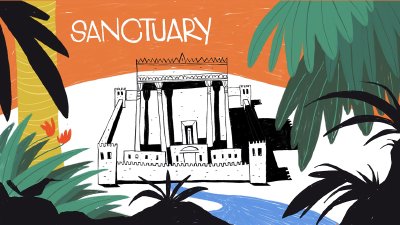


Sanctuary
The Splendor of His Holiness
January 21, 2024 • Rev. James M. Holland • Psalm 96
I got back into my study this Wednesday, after being away with my family for over a week as my dad worsened in the hospital and we brought him home to die with his people. The worst storm in ages was playing havoc with the roads, and it was cold the day my father went to be with Jesus. The next day, my daughter was calling for sledding and snowball fights, as I worked through obituaries, funeral arrangements, and getting our house back to normal. Josh met me at the church to catch up and asked if I needed him to preach. I told him how much I appreciated it, but I needed to be in my study with all the familiar tools of my trade around me. I figured it would be therapeutic; it ended up being even better than I thought, and it did clarify some things for me, in my own thinking and reflection. I can’t wait to share it with you. Psalm 96 is all joy: it overflows with joy and brims with hope. It is eaten up with singing and praising, and the end of the Psalm pictures not the world as we know it, but a future glory—where God’s rule and reign are complete, heaven and earth are one, and all is as it should be. Kidner says it like this: “Where God rules (it implies), his humblest creatures can be themselves; where God is, there is singing. At the creation, ‘the morning stars sang together’; at his coming the earth will at last join in again; meanwhile the Psalter itself shows what effects his presence has on those who, even through a glass, darkly, already see his face.” (Derek Kidner, Psalms 73-150) Notice he says that while we see through a glass darkly, we still see. And also note the effect of this future reality on us now! This week we will talk about it and see just how much better Jesus is. Blessings, Jim
Deep and Wide
January 14, 2024 • Rev. Joshua Smith • Psalm 65
When my kids learned the popular story behind “Ring around the Rosy,” they were mortified. According to some folklorists, it’s actually about the Plague! But, that’s just part of childhood: having your everyday life soundtracked with catchy songs about weighty things you don’t understand. If you grew up in church, some of them had titles like “Father Abraham,” and “Who Built the Ark?” These deceptively simple tunes have lain dormant in your subconscious for decades, until out of the blue one day some sick pastor writes an email mentioning them. Then you spend the rest of the day catching yourself compulsively humming the tune, desperately trying to replace it with something else, (anything else!). One of those for me was “Deep and Wide.” To my knowledge it only has a single line: “Deep and wide, deep and wide, there’s a fountain flowing deep and wide.” The gimmick is that the tune repeats, faster and faster, as each word gets replaced with silly onomatopoetic sounds, until all the participants collapse giggling at the noisy nonsense of it all. It never once occurred to me that this was a song of profound theological significance. It just felt like play. Yet, the Bible is a picture book, and with a special preference for children. One of its central pop-up images is a river that starts with a trickle on a mountain and flows down to drench the earth. The Spirit winds this image through Scripture as a way of saturating our imaginations with a core truth about how we’re made. There’s not a desire we’ve ever had that doesn’t find its refreshing satisfaction in the waters that come from that mountain. Those who drink from it will thirst no more. And perhaps the thing we need to remember most is, the river is deep before it’s wide.
Stillness and Knowledge
December 31, 2023 • Rev. Joshua Smith • Psalm 46
If internet origin stories are to be believed, the “Twelve Days of Christmas” song is not about an eccentric bird lover at all, but is a coded catechism in which each number corresponds to a foundational doctrine of the faith. It’s not a likely story, but it is still a really fun application for the song. In fact, I use it this way with my own family throughout the Christmastide season. We add a new verse each night as we talk about one Savior, two testaments, three virtues, four gospels, and the like. The famous five gold rings are supposedly the Law of Moses, or Torah. You might sometimes hear the word “Pentateuch” used, which simply means “five books.” These five are the foundational stories of the Hebrew faith and the bedrock of all other Scripture. Just like the less obvious bird gifts, even the books that don’t seem to have anything to do with them are still just riffing on the books of Torah. Here we have the people, place, presence, and promises of God laid out, to which all the rest of Scripture responds. The Psalms are no exception, referring unremittingly to the characters, themes, and motifs first established in Moses’ books. As we begin our new sermon series, Sanctuary: Psalms of the Soul Room, we are immediately flooded with the imagery of mountains, cities, rivers, and seas. These geographic features are imbued with spiritual significance from the first pages of the Torah, and the meaning of all subsequent prophecy, and especially the final Revelation, hinges on these connections. As it turns out, the five books are found more precious than gold as a key for unlocking the riches of Scripture. Isn’t it beautiful how poetically our True Love sings to his Beloved?


